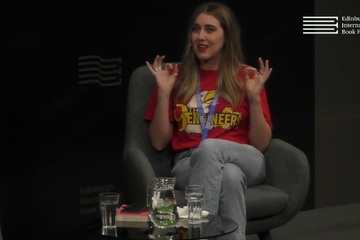More articles Saturday 17 August 2019 4:30pm
“We expect the people who deal with the consequences of the oppression to dismantle the oppression,” says Gina Martin

The feminist activist was talking about her new book Be The Change, an activism handbook inspired by her successful campaign to criminalise “upskirting”. “This book is what I would have wanted at the beginning of the campaign,” she said.
Speaking last night at the Edinburgh International Book Festival with writer Heather Parry, Martin told of her own experience of upskirting – covert photos taken up people’s skirts - and then the campaign she launched to force a change in law. “When I put the petition up, a mini kind of upskirting #MeToo thing happened… in the comments people were just sharing all their stories of upskirting. There were so many of them, I couldn’t believe how many there were. All these really young girls came at the same time to the petition. And they were between 7 and 15 and they were all saying their teacher had upskirted them in school.”
Be The Change offers practical advice on how to become involved in activism, and Martin urged people to get involved; “Positive progression in society always starts with someone standing up and going this happened, and they’re always scared to do it but as soon as a single person stands up… I would put everything I own on the fact that it’s never happened that someone’s stood up and gone ‘this happened to me’ and no one else has had the same experience.”
The book also includes a chapter on race and white privilege, with accompanying notes from an anti-racism campaigner. “It’s a massive privilege to be able to decide to take something on, to try to change society because a lot of people don’t have that choice, they have to because it’s literally their life or their death.” Martin explained. “When we talk about race especially as white people we get very defensive and worried about saying anything wrong and therefore we don’t talk about it. Because if we talk about it that kind of is an admission that we’re part of the problem and we just don’t want to have that conversation.
“And the truth is we’re all part of the problem for the way society is now and it’s not a personal thing and we have to put our egos aside and talk about race. [Racism] is a structure… it’s all the way through our society.”
Martin was asked about the strain of retelling her story and “activism fatigue.”
“We expect the people who deal with the consequences of the oppression to dismantle the oppression,” she said. “I don’t think women should have to tell their traumas to be humanised and people to understand exactly how things are. I think that’s ridiculous. I’ve told my upskirting story probably 400 times and I still cry because I still don’t like talking about it and I have to do it to make people understand how important this is.
So don’t make women or marginalised genders relive their traumas all the time. Listen to them first time, believe them first time.”
- 2026 Festival:
- 15-30 August
Latest News
 Major new partnership with Celtic Connections
Major new partnership with Celtic Connections





